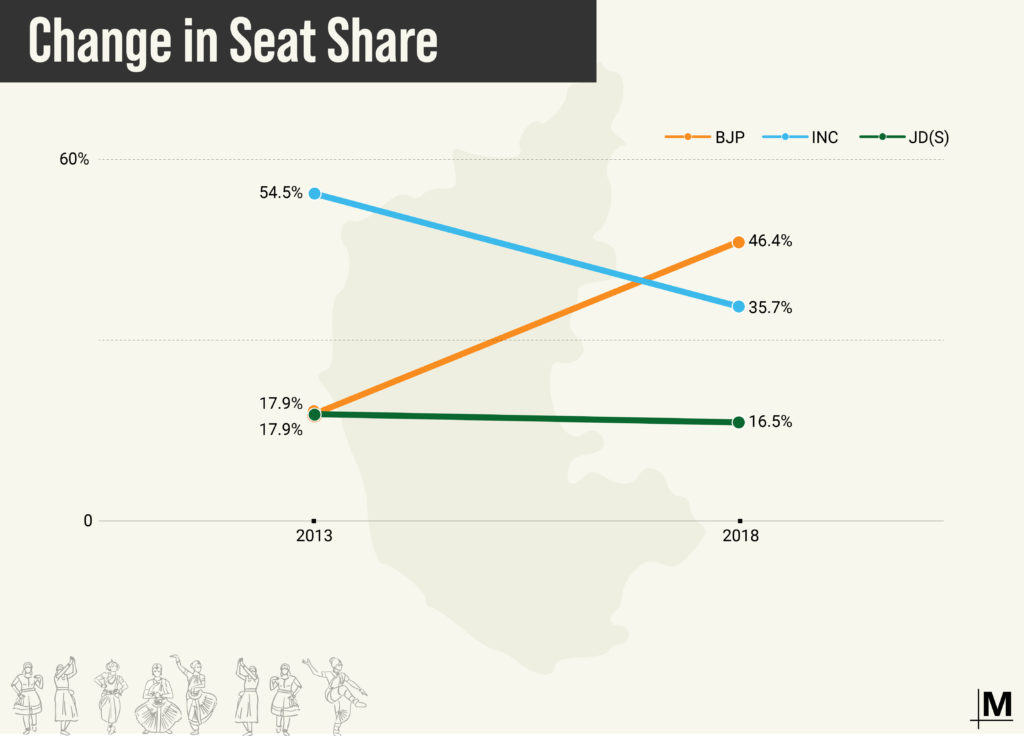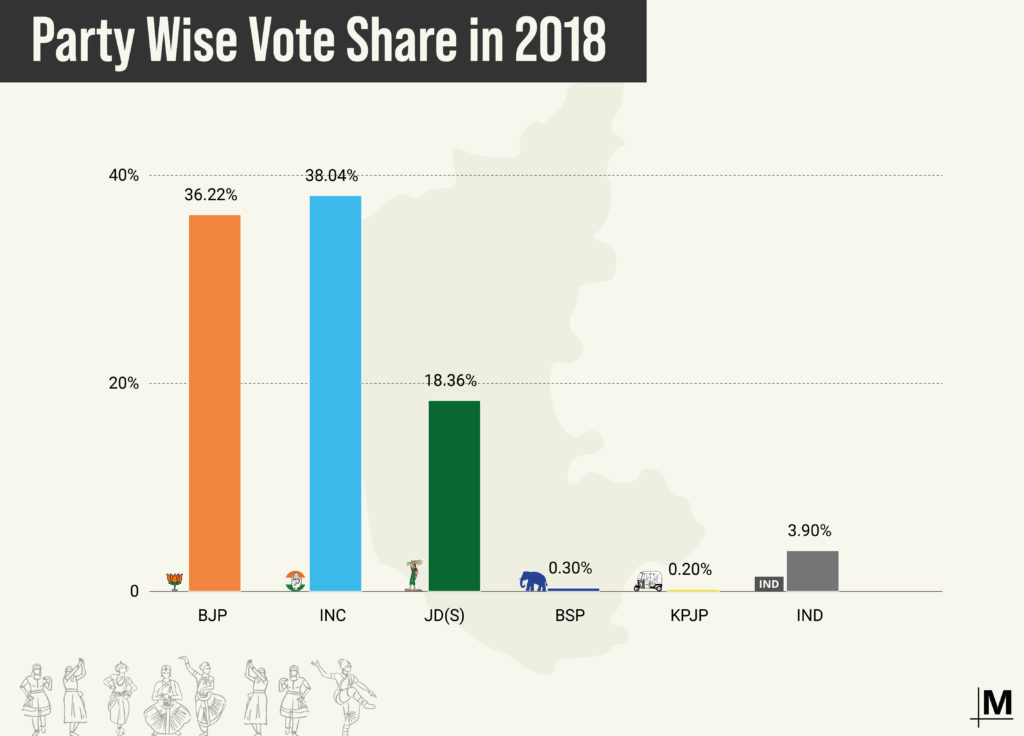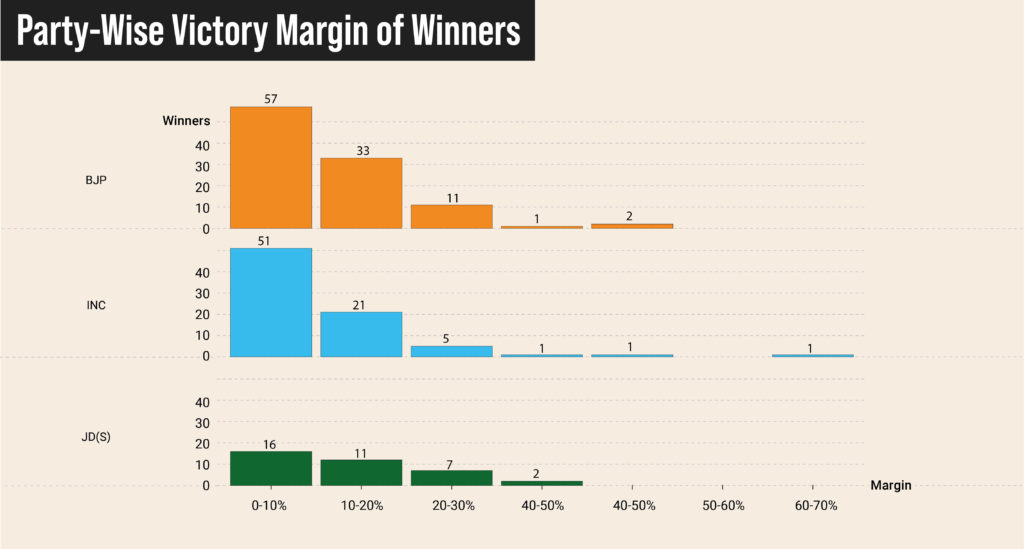The elections for Karnataka Assembly elections were held in a single phase on 12th May,2018, to elect 224 members of the state’s Legislative Assembly. It is noteworthy that the election in two constituencies, Jayanagar and Rajarajeshwari Nagar, were postponed due to the demise of MLA B.N. Vijaya Kumar and a voter fraud scandal, respectively.
A total of 83 political parties and independent candidates participated in the electoral contest, consisting of 6 national political parties, 8 state political parties, and 69 registered unrecognized parties. Notably, the voter turnout of 72.13% during the election marked the highest recorded in Karnataka since the 1952 assembly polls. The counting of ballots was conducted on the 15th of May 2018.
Seats Won by Parties
The 2018 assembly elections in Karnataka saw a high-stakes contest between the incumbent Indian National Congress (INC) and the Bharatiya Janata Party (BJP). Nonetheless, neither political party was able to secure a majority by reaching the halfway mark of 113 seats in the state.

The Bharatiya Janata Party (BJP) secured the highest number of seats, totaling 104, in the assembly election, followed by the Indian National Congress (INC) with 80 seats and JD(S) with 37 seats. The Bahujan Samaj Party (BSP) won a single seat, whereas the regional party Karnataka Pragnyavantha Janatha Party (KPJP) gained one seat and one seat was secured by an independent candidate.

In the 2018 election, the Bharatiya Janata Party (BJP) registered a notable surge in its electoral representation, with a 28.5% increase in the number of seats won compared to the preceding election. In contrast, the Indian National Congress (INC), the incumbent party in the state, witnessed a decline, securing 80 seats, a decrease of 18.8% compared to the 122 seats it had won previously. The Janata Dal (Secular) (JD(S)) won 37 seats, a marginal reduction of 1.4% from its previous tally of 40 seats.
Vote Share


The 2018 Karnataka Assembly Elections witnessed a notable shift in the vote share of major political parties. The Bharatiya Janata Party (BJP) observed a remarkable surge in its vote share, rising from 20.20% in the 2013 elections to 36.22% in the 2018 elections, reflecting a significant jump of 16%.
In contrast, the Indian National Congress (INC) saw a modest increase in its vote share, rising from 36.6% in 2013 to 38% in 2018, denoting a mere rise of 1.4%. Whereas the Janata Dal (Secular) observed a slight decrease in its vote share, declining from 20.2% in 2013 to 18.4% in 2018.
Victory Margin

The analysis of the victory margins of the 2018 Karnataka Assembly elections suggests that the 2018 Karnataka Assembly elections were a closely contested affair, with a significant number of winners securing their seats with narrow margins of victory. For instance, between three prominent parties, they had 134 candidates winning with a margin that falls between 0-10%.

Each of the prominent parties displayed areas of dominance and weak victories. The Bharatiya Janata Party (BJP) secured a narrow victory in Aland, with a margin of 0.43%, while achieving their biggest win in Malleshwaram with a margin of 43.67%.
The Indian National Congress (INC) party’s largest victory was in R Akhanda Srinivasamurthy’s 64.56% margin win in his constituency, while their narrowest victory margin was just 0.16% in Maski. The Janata Dal (Secular) (JDU-S) party’s biggest win came in Shravanabelagola with a margin of 31.69%, while their narrowest margin of victory was only 0.98% in Sindhanur constituency.
Gender-wise Candidate Distribution and Success Rate


The 2018 Karnataka Assembly Elections witnessed the participation of a total of 2,636 candidates representing various political parties. Among them, 2,417 were male candidates while the remaining 219 were female candidates. The election outcome reveals that 216 male candidates and 8 female candidates secured seats in the legislative assembly, indicating a gender-based success rate of 9% for male candidates and 4% for female candidates.
We will be continuously exploring the political landscape of the Karnataka Assembly in greater depth for the upcoming elections in the state. Stay tuned to check out more with Meradesh App available on Appstore and Play Store.
Reach your constituents, gain insights into their motivations, and build campaigns based on data-driven strategies with the Meradesh Platform.
